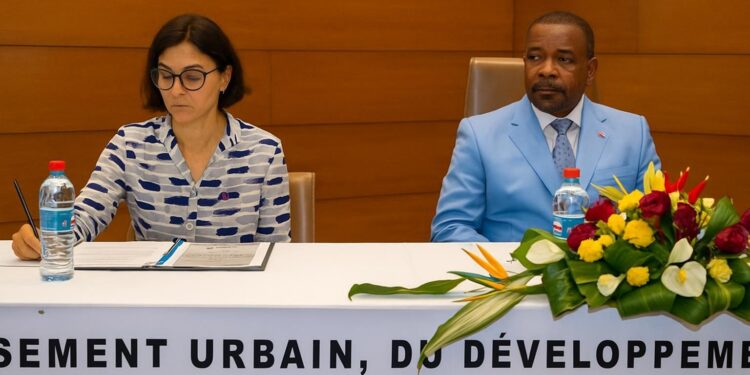A policy milestone validated in Brazzaville
On 14 October in Brazzaville, stakeholders endorsed the National Sanitation Policy 2026-2030, giving the Republic of Congo its first comprehensive framework for urban cleanliness and waste management. The document emerged from the inaugural Urban Sanitation Conference and is positioned as a pillar of national development objectives.
Key targets and strategic vision
The policy aims to slash illness linked to poor hygiene, safeguard ecosystems under climate stress, foster a circular economy and create green employment. Minister Juste Désiré Mondelé described the text as a “strategic compass” designed to align government, partners and communities around practical, measurable goals.
Governance anchored in inclusive leadership
Mondelé stressed that sanitation exceeds routine cleaning; it underpins public health, human dignity and economic growth. By codifying roles and reporting lines, the policy seeks to close a long-standing coordination gap and introduce stricter monitoring of budgets, timelines and performance indicators across urban and rural territories.
UNICEF and AfDB provide technical ballast
Throughout drafting, the ministry worked with UNICEF and the African Development Bank. Both institutions offered analytical support and committed to co-financing implementation. Mondelé applauded their “constant guidance”, noting that multilateral leverage is essential for mobilising concessional loans, guarantees and grant resources in a fiscally constrained environment.
Health dividends for children and communities
UNICEF representative Mariavittoria Ballotta highlighted sanitation as a “powerful catalyst” for child welfare. Cleaner water and effective waste streams reduce diarrhoeal diseases, enhance nutritional outcomes and keep pupils in school. She emphasised that safe latrines and drainage particularly protect the most vulnerable households in Brazzaville and Pointe-Noire.
Climate resilience and environmental stewardship
With Congo’s cities facing heavier rainfall and flooding, upgraded drainage and wastewater treatment are framed as climate-adaptation priorities. By diverting organic waste toward compost or energy recovery, authorities also expect to lower methane emissions, aligning local actions with global commitments on climate mitigation and forest conservation.
Financing mechanisms under discussion
The policy envisages innovative funding, including a guarantee fund channelled through a domestic bank. The tool is intended to ease credit access for households and SMEs investing in latrines, septic services and recycling. Ballotta confirmed ongoing talks to operationalise the vehicle during the 2026-2030 inclusive sanitation programme.
Local governments at the execution front line
Brazzaville council president Dieudonné Bantsimba argued that rapid urban expansion requires coherent national guidance yet decentralised delivery. Municipalities will lead waste collection, user-fee design and public education, while provinces coordinate rural sanitation. Participants urged a future sanitation code to clarify mandates and protect local revenue streams.
Capacity building and behavioural change
Stakeholders agreed that engineering works must be matched by social mobilisation. Training modules for technicians, entrepreneurs and community health workers will accompany awareness campaigns promoting hand-washing and responsible waste disposal. Mondelé called for “determination, speed and rigour” so that field actions translate into measurable public-health gains.
Economic potential of the circular model
The drive toward recycling, composting and resource recovery could open new market niches. Entrepreneurs able to transform organic waste into fertiliser or energy stand to benefit from policy incentives, while urban farms may tap consistent compost supplies, stimulating employment along the waste-value chain.
Regulatory gap and next steps
Workshop delegates flagged the absence of a dedicated sanitation code. The ministry signalled plans to update legislation, adjust tax incentives and refine service-level standards. A clear rulebook should enhance investor confidence and anchor public-private partnerships in waste collection, treatment plants and sludge-to-energy ventures.
Monitoring, evaluation and transparency
A national dashboard will track project delivery, budget absorption and health indicators. Quarterly reviews involving civil society and private stakeholders aim to keep spending efficient and outcomes visible. The approach echoes international best practice and reinforces accountability for centrally disbursed funds.
Social inclusion front and centre
The policy underscores gender-sensitive facilities in schools and markets, recognising that adequate sanitation promotes safety and economic participation for women and girls. Subsidy windows for low-income households seek to avert disparities, ensuring that the right to sanitation translates into tangible access across all income brackets.
Synergy with Sustainable Development Goals
By addressing water, health, education, urban resilience and decent work, the strategy contributes directly to several SDGs. Mondelé framed it as “a lever of transformation” capable of reinforcing Congo’s international positioning and bolstering investor perception of policy coherence in the infrastructure and green-growth arenas.
Risk management and mitigation
Delayed funding, weak institutional capacity and limited public awareness surfaced as potential hurdles. The policy prescribes contingency planning, donor coordination and incremental targets to maintain momentum. Authorities also plan to pilot projects before scaling nationwide, thereby refining technical choices and avoiding cost overruns.
Timeline toward 2030
Initial actions focus on metropolitan hotspots, with construction of transfer stations and sanitation hubs by 2025. From 2026, household-level credit lines and provincial capacity-building roll out. Periodic evaluations in 2027 and 2029 will adjust course and feed data into the design of a post-2030 sanitation roadmap.
An agenda aligned with development ambitions
Congo’s National Sanitation Policy epitomises a pragmatic yet ambitious response to public-health, environmental and employment imperatives. Backed by multilateral partners and grounded in local participation, its success will hinge on disciplined execution, transparent monitoring and sustained financing, all aimed at delivering a cleaner, more resilient urban future.












































